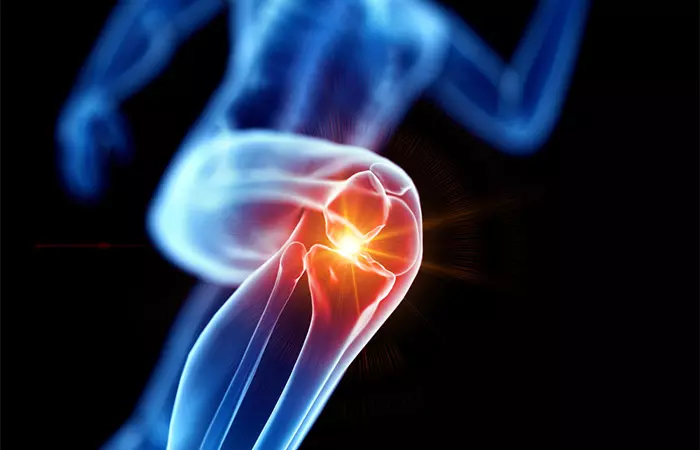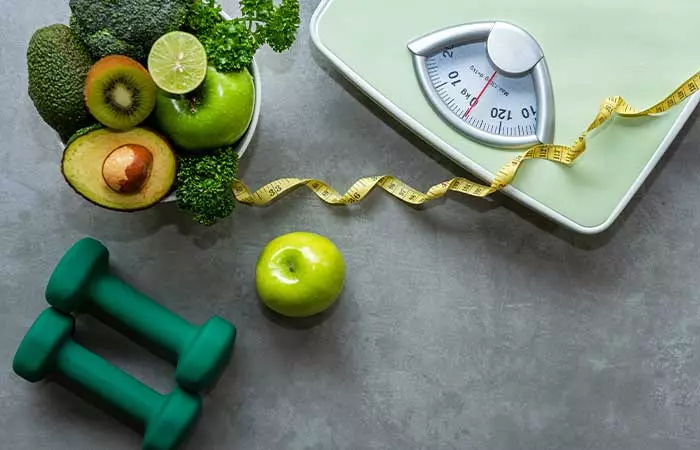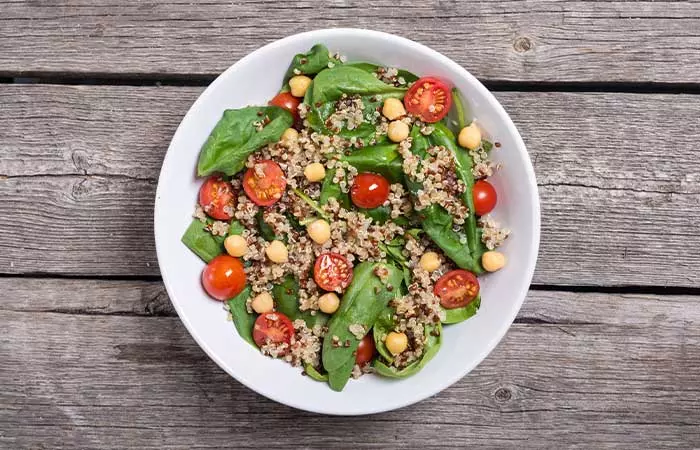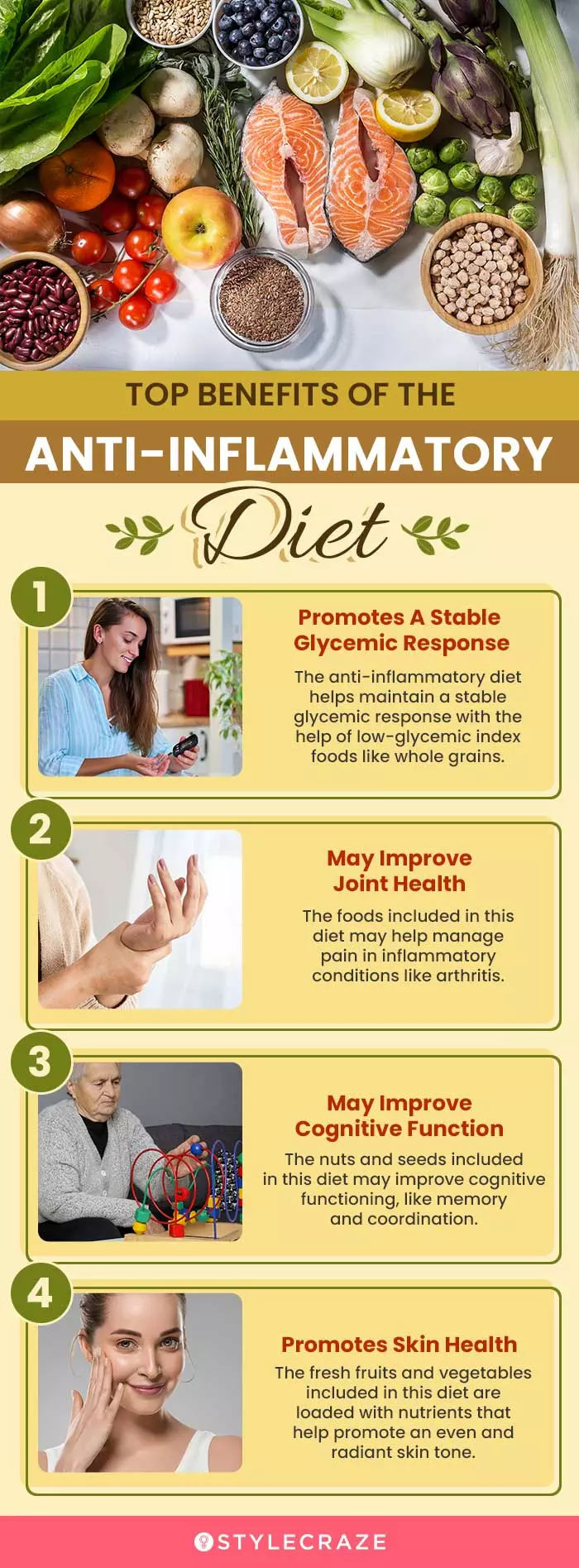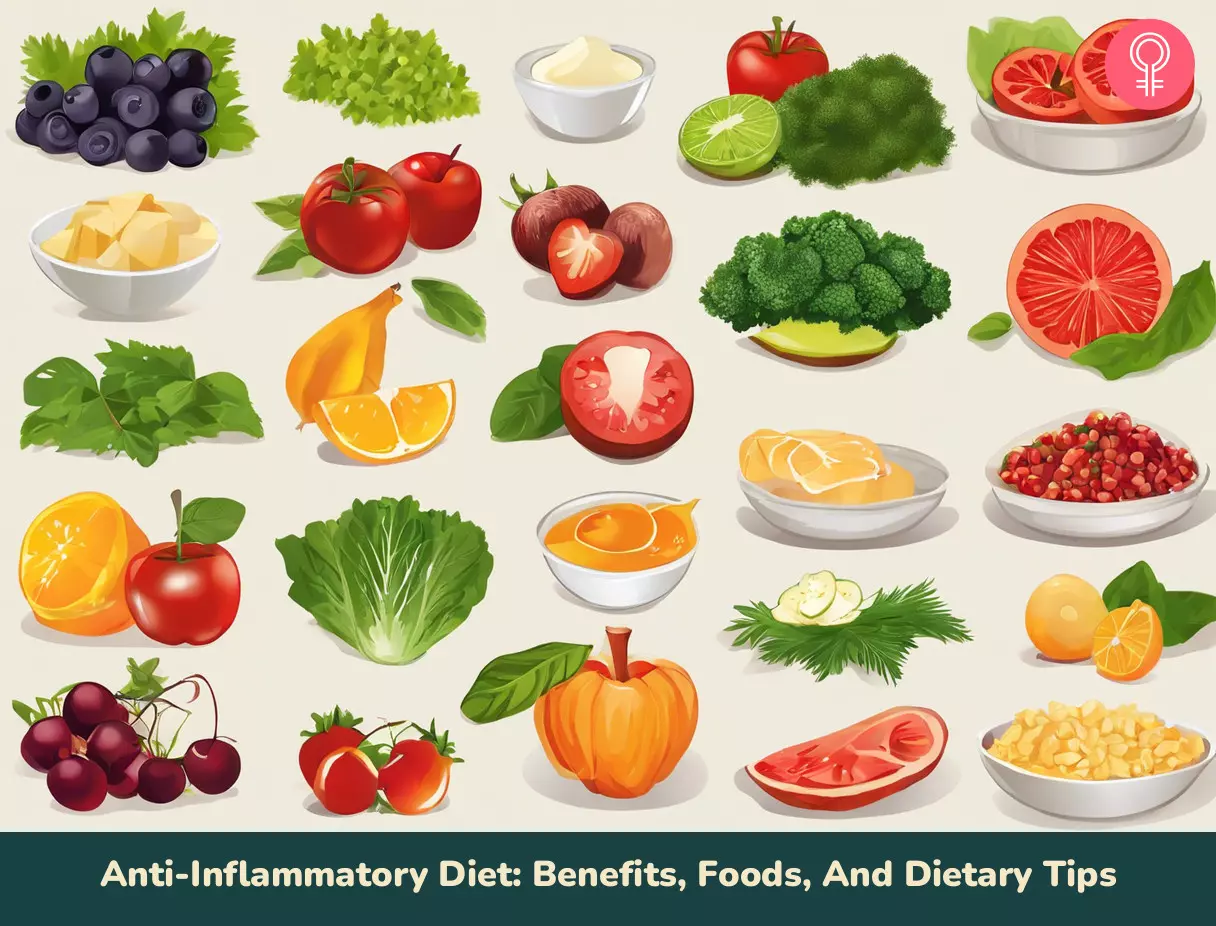What Is An Anti-Inflammatory Diet?
An anti-inflammatory diet is a wise choice for managing chronic body inflammation. It encourages the consumption of wholesome foods like fruits, vegetables, whole grains, lean proteins (such as fish and chicken), and healthy fats (like olive oil and nuts). Conversely, it steers clear of inflammatory culprits like processed foods, sugary snacks, and trans fats. Boosting its effectiveness and flavor profile are anti-inflammatory herbs and spices like turmeric. This diet is crafted to reduce the risk of inflammation-related diseases like heart problems and autoimmune disorders, all the while promoting your overall health. Although the principle of limiting inflammation aggravating foods remains the same, there are many types of anti-inflammatory diets that you can pick from. Check them out in the section below.
Types Of Anti-Inflammatory Diet
1. Mediterranean Diet
The Mediterranean diet draws its inspiration from the countries in the Mediterranean Sea. It places a strong focus on incorporating fresh fruits, vegetables, whole grains, lean protein sources, such as fish and poultry, and healthy fats, like olive oil and nuts, into daily meals. This eating plan restricts the consumption of red meat and processed foods, opting instead for rich natural seasonings like herbs and spices. This dietary approach may help reduce the risk of chronic diseases and inflammation and improve your body health (1).This makes it adaptable to a wide range of dietary preferences and health goals.
2. Paleo Diet
The Paleo Diet majorly focuses on whole, unadulterated foods. It celebrates the likes of lean meats, sea food, fruits and vegetables, nuts, and seeds. In its resolute exclusion of grains, dairy, and processed food, the Paleo Diet endeavors to mitigate inflammation, fostering an environment conducive to aiding your overall well-being (2).
3. Ketogenic Diet
Focusing on a path of high fat and meager carbohydrates, the Ketogenic Diet pushes the body into a state of ketosis. In this diet, fats are more emphasized, followed by the inclusion of moderate protein food sources. This dietary approach helps protect against inflammation and promotes your health (3). A few elements of the keto diet may have anti-inflammatory properties, even if it isn’t specifically designed to serve the purpose of reducing inflammation. If you want to follow this diet to reduce inflammation, consult a registered dietitian or a doctor for a customized plan that suits your health needs.
4. Vegan Diet
The Vegan Diet focuses on plant-based nourishment and includes a wide variety of fruits, vegetables, legumes, and grains that are loaded with nutrients. This diet helps subdue inflammation and endorses optimal health by steering clear of saturated fats and drawing many health benefits from plant-derived antioxidants (4).
5. Autoimmune Protocol (AIP)
The AIP Diet is a special elimination plan for those dealing with autoimmune issues. It goes beyond the regular Paleo diet by excluding more possible triggers like processed foods, alcohol, additives, refined sugars, coffee, tea, and oils. This diet also helps calm the immune system and reduce inflammation (5). Along with reducing inflammation, these diets and the foods included in them can also offer an array of health benefits. Check them out in the next section.
Benefits Of Anti-Inflammatory Foods
1. Helps Maintain A Stable Glycemic Response
Regular consumption of anti-inflammatory food has been linked to a decreased risk of various diseases by combating inflammation. It helps maintain a stable glycemic responsei The change in blood sugar levels after consuming carbohydrates. because of the food included, like whole grains and a few vegetables that are low in their glycemic index (6).
2. May Improve Joint Health
Conditions like arthritis may often cause pain, swelling, and limited mobility, significantly impacting one’s quality of life. Anti-inflammatory food may help manage these symptoms, reducing pain and improving mobility. They can be a valuable component in combating inflammation (7).
3. May Reduce The Risk Of Cancer
A diet that is packed with highly anti-inflammatory food may significantly reduce the risk of cancer. It can be attributed to the food included in these diets. Certain foods like vegetables, legumes, fruits, nuts, seeds, cereals, and olive oil may help reduce the risk of certain types of cancer (8).
4. May Support Cognitive Function
Consuming anti-inflammatory food, particularly nuts, may help combat inflammation and support cognitive functioning (9). However, more research is warranted in this regard.
5. May Promote Skin Health
Acne is a chronic, inflammatory skin condition (10). Including anti-inflammatory foods like fresh vegetables, and fruits, grains and healthy fats may help you manage acne, prevent breakouts, and help promote skin health.
6. May Promote Gut Health
The anti-inflammatory diet is a potent promoter of gut health. By emphasizing high-fiber foods like fruits and vegetables, it nurtures a diverse gut microbiome, supporting digestive well-being (11). Furthermore, the antioxidant-rich foods in this diet enhance gut microbiota and prevent inflammation (12). Key components in this diet, like ginger and turmeric, offer direct anti-inflammatory effects that may benefit individuals with gastrointestinal issues (13). In addition, the anti-inflammatory diet also includes foods like walnuts and fatty fish that are rich in omega-3 fatty acids, known to reduce gut inflammation and contribute to a healthier gut environment (14). People with gut issues may find significant relief and support from this diet. Those with Crohn’s disease, besides this diet, may check out a Crohn’s disease diet plan that emphasizes anti-inflammatory foods to help manage inflammation and support overall gut health.
7. Helps Reduce Oxidative Stress
The anti-inflammatory diet plays a pivotal role in reducing oxidative stress within the body. It counteracts the harmful effects of free radicals by focusing on antioxidant-rich foods like berries (15). Incorporating foods such as ginger, that possess potent anti-inflammatory properties, inhibits oxidative damage to cells (16). Also, this diet discourages the consumption of pro-inflammatory foods, like processed sugars and trans fats, that are known to increase oxidative stress. Although an anti-inflammatory diet offers an array of benefits, there is also a popular opinion that it aids weight loss. Although there is no direct evidence for this, a few contributing factors are listed below.
Can An Anti-Inflammatory Diet Lead To Weight Loss?
Good Foods: This diet encourages healthy eating with fruits, veggies, lean proteins, and good fats. These ingredients may aid weight loss as they are low in calories. These nutrient-rich foods also keep your energy levels high so you can exercise, burn calories, and stay in shape.
No Junk Food: This diet avoids junk food like chips, soda, and unhealthy fats. Cutting these out can prevent weight gain and the lethargy that comes from eating processed and oily food.
Balanced Meals: The diet promotes balanced meals with a mix of carbs, proteins, and fats. Balanced meals can keep you full and less likely to overeat.
Anti-Inflammatory Benefits: Some of the food in this diet, like fish and nuts, have nutrients that make your body work better. This might help you control your weight.
Healthy Digestion: Eating foods with fiber, like fruits and veggies, helps your stomach work well. A happy tummy can help with weight control.
Less Sugar: By avoiding sugary stuff, this diet can help keep your blood sugar stable. That can stop energy crashes that lead to weight gain.
There are a wide variety of foods that can help you get all the benefits offered by an anti-inflammatory diet, including weight loss. Know what these foods are from the section below.
Foods To Eat On Anti-Inflammatory Diet
You can improve your health by adding these foods to your daily meal plans. Plan a balanced meal by adding a bit of every food category. And stay consistent! Although the list may seem like it includes almost everything, you need to avoid a few foods when you are on an anti-inflammatory diet. Know what these are from the section below.
Foods To Avoid on Anti-Inflammatory Diet
Processed Foods:
Sugary snacks (e.g., candy, pastries) Sugary drinks (e.g., soda, energy drinks) Fast food (e.g., burgers, fries) Processed meats (e.g., hot dogs, sausages) Packaged snacks (e.g., chips, crackers)
Trans Fats and Saturated Fats:
Margarine and other trans fat-containing products Deep-fried foods (e.g., fried chicken, french fries) Fatty cuts of red meat (e.g., beef, pork) Full-fat dairy products (e.g., whole milk, cheese) Butter and lard
Refined Grains:
White bread White rice Sugary cereals Most baked goods (e.g., cakes, cookies)
Excessive Added Sugars:
High-sugar breakfast cereals Sugary desserts (e.g., ice cream, pastries) Sweetened beverages (e.g., fruit juices, sports drinks)
Processed and Red Meat:
Bacon Sausages Processed deli meats (e.g., salami, bologna) Beef and pork with high fat content
Excessive Salt:
Highly salted snacks (e.g., potato chips) Canned soups and processed foods with added salt Excessively salty condiments (e.g., soy sauce)
Food Additives:
Artificial sweeteners (e.g., aspartame) Artificial coloring and flavoring
Although there are many foods excluded from the anti-inflammatory diet, by planning your meal correctly, you can create a healthy meal plan. Scroll down below for a handy sample meal plan to get an idea of how to plan your diet every week.
Sample 7-Day Anti-Inflammatory Diet Meal Plan
Note: The meals added below do not contain serving sizes. Please check the Foods To Eat section for them or consult a nutritionist or dietician for a personalized serving size. In addition to this meal plan, there are a few specific foods you may need to include if you want to target certain conditions like IBS, Arthritis, Gastritisi Inflammation of the stomach lining caused by certain health conditions or medicines, excess alcohol, or smoking. , or if you want to follow a gluten-free anti-inflammatory diet. Check them out.
Anti-Inflammatory Foods For IBS
Soluble Fiber-Rich Foods: These foods contain fiber that may effectively help manage IBS (17).
Oats Apples Citrus fruits Carrots Psyllium husk
Ginger: Ginger has proven to be effective in the management of IBS (18).
Fresh ginger Ginger tea Ginger powder
Low-FODMAP Foods: These are foods low in fermentable carbohydrates and have been proven effective in the management of IBS (19).
Rice Chicken Strawberries Lactose-free dairy products
Probiotic-Rich Foods or Supplements: Probiotics are proven effective in the management of IBS (20). Yogurt with live cultures Fermented foods (kimchi and sauerkraut) Probiotic supplements
Anti-Inflammatory Foods For Arthritis
Fatty Fish Fatty fish is rich in omega-3 fatty acids that may decrease interleukinsi The immune system-signaling proteins involved in inflammation. IL-1 and IL-6, inhibiting inflammation (21).
Salmon Mackerel Sardines Trout
Turmeric Turmeric contains curcumini An active compound found in turmeric that has anti-inflammatory properties. . It is a natural anti-inflammatory compound (22). Oil Extra virgin olive oil is rich in antioxidants and also helps combat inflammation (23).
Anti-Inflammatory Foods For Gastritis
Whole Grains Whole grains like bland oats and rice (avoid highly seasoned or spicy varieties) are gentle on the stomach and can help soothe irritation (24) (25). Tea Green tea is rich in antioxidants and is proven effective for combating inflammation (26). Ginger Ginger has been proven effective in combating gastritis (27).
Ginger tea Ginger powder Ginger supplements
Gluten-Free Anti-Inflammatory Foods
Fruits And Vegetables
Berries (blueberries, strawberries, raspberries) Leafy greens (spinach, kale, Swiss chard) Apples Broccoli Carrots Sweet potatoes
Fatty Fish
Salmon Mackerel Sardines Trout
Nuts And Seeds
Almonds Walnuts Chia seeds Flaxseeds
Legumes
Chickpeas Lentils Black beans Peas
Lean Proteins
Chicken Turkey Tofu Lean cuts of beef or pork
Healthy Fats
Avocado Olive oil Coconut oil
Herbs And Spices
Turmeric Ginger Cinnamon Garlic
Gluten-Free Whole Grains
Quinoa Brown rice Millet Buckwheat
Dairy Alternatives
Almond milk Coconut yogurt Cashew cheese
Anti-Inflammatory Teas
Green tea Chamomile tea Turmeric tea (made from fresh turmeric)
Many aspects of these diet plans are often confused with autoimmune diets. Although both anti-inflammatory and autoimmune diets prioritize nutrient rich and healthy foods, they also differ in a few aspects. Check out how they compare and contrast from the section below.
Anti-Inflammatory Diet Vs. Autoimmune Diet
Every diet offers an array of health benefits. Some may be long term, while others are for a shorter time period. However, like any other diet, the anti-inflammatory diet also comes with its own set of disadvantages. Check them out in the section below.
Disadvantages Of The Anti-Inflammatory Diet
Lack Of Variety: Anti-inflammatory diets often limit the types of food you can eat. This means you might end up eating the same things over and over again, which can get boring.
Expensive Groceries: Buying the special foods recommended for this diet can be costly and may strain your budget.
Social Challenges: When you follow an anti-inflammatory diet, it can be tricky to go out with friends or attend social events. You might feel left out when others are enjoying foods you can’t have.
Missing Nutrients: This diet may cause you to miss out on important nutrients. For example, if you cut out dairy, you might not get enough calcium, essential for strong bones.
However, to combat a few of these drawbacks, you may follow a few tips listed in detail in the next section
Anti-Inflammatory Diet Tips
Stay Hydrated
Remember to drink enough water throughout the day. Water helps your body function properly and keeps inflammation in check.
Listen to Your Body
Pay attention to when you feel hungry or full. Overeating can cause inflammation, so avoid it. Eat slowly, properly chewing your food. It is recommended to chew a morsel of food 20 times before you swallow it. You can also follow the Japanese principle of eating until you are 80% full. Drink a glass of water before and after your meal.
Watch Your Portions
While the anti-inflammatory diet is favored for its lack of restriction and portion control, you should be mindful of how much food you put on your plate. Eating the right amount can help prevent inflammation caused by excessive calories.
Cut Down on Sugary Drinks
Avoid consuming sugary drinks like soda and fruit juices. Too much sugar can lead to inflammation, so it’s a good idea to limit these.
Cook Fresh at Home
When you can, cook your meals using fresh ingredients at home. This way, you have more control over what you eat, and it’s often healthier. Instead of deep frying or grilling your food, opt for healthier options like smoking or steaming.
Avoid Processed Foods
Try to eat less processed and fast foods. These often have unhealthy fats, lots of salt, and additives that can make inflammation worse. Choosing natural, unprocessed foods is a better choice. By following these tips and by incorporating a wide variety of fruits and vegetables, inflammation can be effectively managed. But you need not compromise on your taste. The section below lists a few yummy recipes you can try if you are on an anti-inflammatory diet.
Anti-Inflammatory Diet Recipes
1. Breakfast: Turmeric Oatmeal
Ingredients
1 cup rolled oats 2 cups water or almond milk 1 teaspoon ground turmeric 1/2 teaspoon ground cinnamon 1/4 teaspoon ground ginger 1 tablespoon honey or maple syrup (optional) Chopped nuts and fresh berries for topping
How To Prepare
2. Lunch: Quinoa And Chickpea Salad
Ingredients
1 cup cooked quinoa 1 can (15 oz) chickpeas, drained and rinsed 1 cup cherry tomatoes, halved 1 cucumber, diced 1/4 cup red onion, finely chopped 1/4 cup fresh parsley, chopped Juice of 1 lemon 2 tablespoons extra-virgin olive oil Salt and pepper to taste
How To Prepare
3. Snack: Almond Butter And Banana Rice Cakes
Ingredients
2 rice cakes (choose whole-grain or brown rice) 2 tablespoons almond butter 1 ripe banana, thinly sliced 1 teaspoon honey (optional) A sprinkle of cinnamon
How To Prepare
4. Dinner: Baked Salmon With Roasted Veggies
Ingredients
4 salmon filets 2 cups broccoli florets 2 cups cauliflower florets 1 red bell pepper, sliced 1 tablespoon olive oil 2 cloves garlic, minced 1 teaspoon dried rosemary 1 teaspoon dried thyme Salt and pepper to taste Lemon wedges for serving
How To Prepare Can a vegetarian diet reduce inflammation? Yes, a well-balanced vegetarian diet rich in fruits, vegetables, and plant-based proteins can help reduce inflammation. Is coffee acceptable on an anti-inflammatory diet? In moderation, coffee can be part of an anti-inflammatory diet, but excessive consumption may have mixed effects. Are eggs inflammatory? Eggs are generally considered non-inflammatory (28). These can be part of an anti-inflammatory diet when prepared healthily. What are some examples of cheap foods that fight inflammation? Budget-friendly anti-inflammatory foods include oats, beans, lentils, frozen fruits and vegetables, and affordable spices like turmeric and ginger. Which diseases can an anti-inflammatory diet help fight? An anti-inflammatory diet may help in managing conditions like arthritis, heart disease, diabetes, and some digestive disorders by reducing inflammation in the body.
Illustration: Anti-Inflammatory Diet: Benefits Foods And Dietary Tips
Although there are many foods claimed to effectively combat inflammation, there are a few ingredients that really work well. Check out the video below to know what foods the experts suggest.
